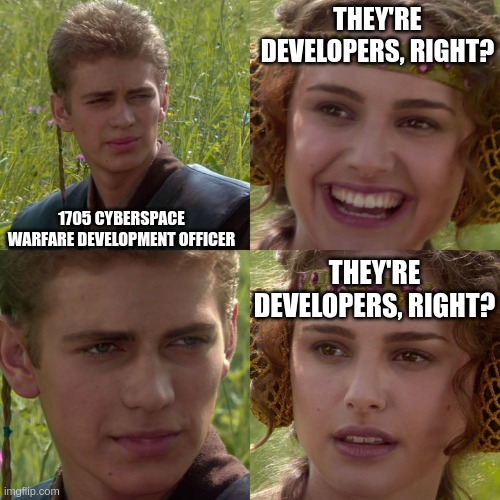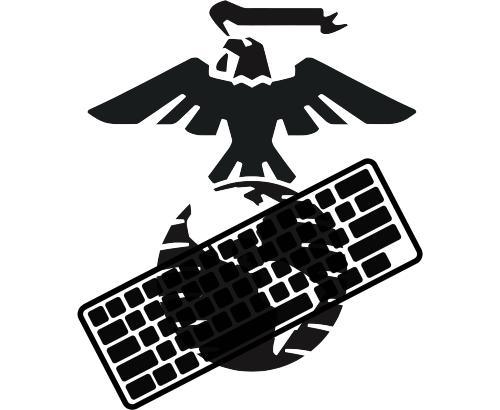Seeking what is true is not seeking what is desirable.
Albert Camus, The Myth of Sisyphus
When the average civilian envisions the humans conducting military cyber operations, one of the characters their imagination likely conjures is a Marine Cyber Warfare Development Officer, the 1705 Military Occupational Specialty (MOS). Combining the best aspects of military precision and discipline with technical acumen and cyberspace expertise, the 1705 is supposed to be the galaxy-brained, über-hacker and thought-leader we need expanding the art of the possible, bending cyberspace adversaries to our will. Someone with deep technical skills and experience. A cyber sage.
The Cyber Warfare Development Officer is a senior subject matter expert (SME) that manages the cyber warfare development lifecycle in order to create, integrate, synchronize, and deliver effects in concert with other warfare domains.
FY20 Marine Corps MOS Manual
The Marine Corps’ MOS manual claims that 1705s are subject matter experts — SMEs in military vernacular. It’s a restricted MOS, meaning that its ranks are filled with Marines that have risen from the enlisted ranks, become warrant officers, and finally, having proven their mettle through both of these rank structures, become captain, major, and lieutenant colonel limited duty officers, or LDOs. These are no spring chickens; they’re senior folks that have been around the Marine Corps for a hot minute, and they’re allegedly the experts in their fields.
But 1705s aren’t just supposed to posses any cyber expertise — rather, they’re explicitly charged with being able to perform capabilities development — it’s the first of their two MOS training and readiness (T&R) manual standards. And what does “performing capabilities development” mean? To quote the T&R manual, the capabilities development standard is to:
Design, develop, test, and evaluate tools and capabilities required to conduct cyberspace operations throughout the systems development life cycle.
Information Maneuver Training and Readiness Manual, May 2022
By the Marine Corps’ own measure, the 1705 MOS is an abject failure.

Not a single 1705 can credibly be called a capability developer. The MOS is, by and large, filled with professional and otherwise capable Marines that excelled in their previous enlisted and warrant officer MOSes. But they aren’t developers, weren’t selected for their ability to do development, and haven’t, in the time that they’ve been 1705s, put themselves in a position to learn how to do development or lead capability development efforts.
This is a real and urgent problem. The Marine Corps should be training the next generation of capability developers and incentivizing those in the service now to stick around and solve our hard problems, rather than heading for the exits to solve the ones that await in industry or elsewhere in government. Instead, we’ve populated an MOS full of dedicated Marine Corps officers that have no idea how to perform their core competency.
How to fix the 1705 community
The demands placed on Marine Corps cyberspace forces require a pool of talented Marine developers. Because none of the enlisted or warrant officer MOSes that feed the 1705 MOS require or even mention capability development in their training and readiness standards, it is unsurprising that these Marines aren’t magically computer programmers upon becoming LDOs. So, where should MarForCyber and the 17xx Occupational Field look to actually find capable Marines to do development?
The unrestricted officer ranks are filled with these Marines. Consider the backgrounds of many of our lieutenants and captains. In many cases, these officers graduated from prestigious universities with nationally-ranked computer science programs, and prevailed against stiff competition to earn the 1702 cyberspace officer MOS. Despite possessing four or more years of experience actually doing software development, competing in Capture-The-Flag competitions (CTFs) , and taking highly-technical coursework, these Marines are almost universally relegated to non-technical leadership work after potentially being shoved through a training pipeline for a cyberspace work role they’ll never actually perform (readiness statistics über Alles). The 1702s are barred from doing cyberspace development because that’s the domain of the 1705s. But, because the ostensible 1705 developers don’t possess the requisite skills for their work, they’re also placed in staff and leadership positions that any unrestricted 1702 cyber officer could perform. The sad result is that we possess a technical officer cadre in name only, while those capable of actually performing the work waste away watching it go undone, counting down the days remaining until their escape from this Kafkaesque morass.
The obvious solution is to allow a select number of 1702s the opportunity to compete to laterally move into the 1705 MOS. A selection panel that evaluates not only the administrative markings of the prospective candidates, but also observes demonstrations of the applicants’ technical abilities, should be the arbiter of who becomes a Cyber Warfare Development Officer. This will ensure that the 1705 MOS is populated with true capability development experts, rather than Marines who have spent years cultivating skills in other, adjacent fields that are poor indicators of capability development prowess.
Allowing unrestricted officers the potential to transition to a restricted MOS will likely be an incredibly contentious prospect for some, particularly those current cyber warrant officers and 1705s that would face increased competition for promotion. But we must remember that our mission is not to best protect special communities’ proverbial rice bowls, but rather to optimize our effectiveness in the cyberspace domain. Capability development is a core competency of cyberspace warfare, and we should be making every effort to maximize our advantage over our adversaries. Currently, we are not.
Conclusion
While the 1705 MOS is in theory a key component of a healthy, functional 17xx Occupational Field, in practice, it is devoid of Marines that have ever performed the job or often even understand what it entails. Imagine 2802 Electronics Maintenance Officers unaware of the maintenance management process or 0605 Cyber Network Operations Officers who’ve never programmed a router. This is the disturbing reality we in the 17xx community find ourselves in.
Fortunately, not all hope is lost. We already possess capability development talent in the unrestricted officer community. Though it will require some unorthodox manpower management, we can solve the 1705 problem by competitively selecting technical 1702s to plug the knowledge gaps currently rampant among 1705s. We should not be deterred by the probable unpopularity of these moves among those with most to lose from such a shift, namely, nontechnical 1705s bereft of any capability development experience. The stakes are too high and need too great, to continue on our current trajectory. Today, the 1705 Capability Development Officer MOS is no more than a myth.

